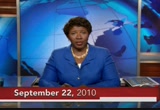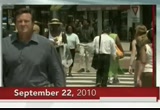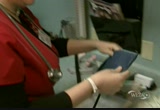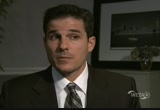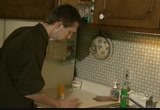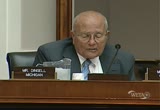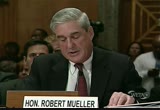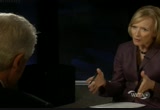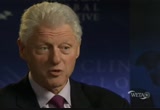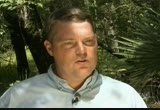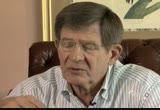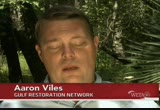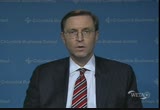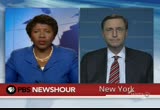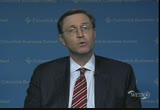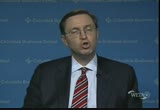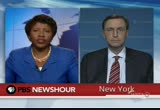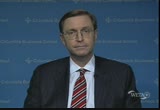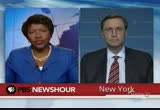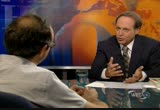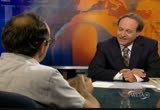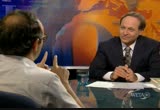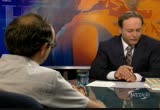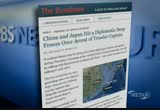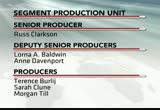tv PBS News Hour PBS September 22, 2010 7:00pm-8:00pm EDT
7:00 pm
>> ifill: good evening. i'm gwen ifill. president obama said health care legislation set to go into effect tomorrow will prevent insurance companies from unfairly denying coverage to people in need. >> woodruff: and i'm judy woodruff. on the "newshour" tonight, betty ann bowser looks at the impact political and otherwise of the reform legislation six months after its passage. >> ifill: then, judy talks to former president clinton about the economic recovery, his global initiative and the upcoming midterm elections. >> if this is a referendum on people's anger and apathy, so our side stays home and their side's in play, we don't cowell. if it's a choice between who is going to do what, we can do well, and that's what i hope it will be. >> woodruff: tom bearden reports from louisiana on the state's growing battle against coastal erosion, in the wake of the b.p. oil spill. >> large chunks of louisiana's coastal wetlands are literally
7:01 pm
dissolving and so are some of the nation's best fishing ground. >> ifill: plus, we hear from former white house economic advisor glenn hubbard, in the first of several conversations on whether to extend the bush- era tax cuts. >> woodruff: and jeffrey brown talks to author gary shteyngart about his new novel set in a not so far off america-- "super, sad, true love story." >> ifill: that's all ahead on tonight's "newshour." major funding for the pbs newshour has been provided by:
7:02 pm
>> this is the engine that connects abundant grain from the american heartland to haran's best selling whole wheat, while keeping 60 billion pounds of carbon out of the atmosphere every year. bnsf, the engine that connects us. >> and by the bill and melinda gates foundation. dedicated to the idea that all people deserve the chance to live a healthy productive life. and with the ongoing support of these institutions and foundations. and... this program was made possible by the corporation for public broadcasting. and by contributions to your pbs station from viewers like you. thank you. >> ifill: the health care reform law reached a kind of
7:03 pm
anniversary today, six months since president obama signed it into law, big new changes are set to take effect. health correspondent betty ann bowser has the story. >> hey, everybody. hello, hello! good to see you guys! >> reporter: the president marked the occasion in a northern virginia neighborhood today. his goal: to sell the six-month- old law to voters, six weeks before the mid-term elections. >> and so what we realized was we had to take some steps to start dealing with these underlying, chronic problems that have confronted our economy for a very long time. and health care was one of those issues that we could no longer ignore. so it was bankrupting families, companies and our government. so we said we have to take this on. >> reporter: at the same time, mr. obama acknowledged many americans still don't like or don't understand the new law and he said he's partly to blame. >> sometimes i... i fault myself for not having been able to make
7:04 pm
the case more clearly to... to the country. we spend-- each of us who have health insurance spend about a thousand dollars of our premiums on somebody else's care. >> reporter: in fact, the latest round of polling underscored that health care reform has yet to win strong support. a new associated press survey found 40% disapproved, while 30% approved. the rest had no opinion. the effects of those flagging poll numbers have been showing up on the campaign trail, where most democrats have shied away democrats who voted for reform now face voters unhappy with the changes. republicans, in turn, have pressed the issue and even talk of repealing the reforms, if they take back control of congress. >> in my opinion, obama care will ruin the best health care system in the country-- in the world, and it will bankrupt our country.
7:05 pm
>> reporter: in the meantime, most of the major provisions, like coverage for millions of the uninsured don't kick into gear until 2014. but several key reforms focused on the insurance industry take effect tomorrow. as of thursday, providers will have to stop imposing lifetime caps on coverage. they'll be barred from canceling insurance for people who become sick. and from denying coverage to children with pre-existing conditions. in addition, young people will be able to stay on their parents' insurance policies until age 26. the president was joined by today people who said they'll benefit from changes like those. across the country, the debate continues between those who welcome the new law, and those who warn of what's to come.
7:06 pm
seven-year-old thomas wilkes will no longer have caps put on his coverage. he's one of 20,000 americans the white house says will be helped by the new ban. while he looks perfectly healthy, thomas need invaconvenience medications every day to treat severe hemophilia. a deadly blood-clotting disorder. >> most of the cost of our care is in the medication and it's medication he needs to survive and live a happy life, a productive life. without it he'd risk complications of bleeding in his joint, severe arthritis. he basically would become disabled before he's a teenager. >> reporter: dad nathan wilkes says the injections are over $1,000 a day. without them, he could develop a bleed in some part of his body that could be fatal. >> his cost, depending on the year could be anywhere from half a million to a million dollars a year. >> reporter: thomas has
7:07 pm
reached the maximum lifetime caps on two different insurance policies, so at one point, nathan and his wife, sanjay were desperate. >> we had social workers saying get a divorce because if you get a divorce and your wife doesn't work the kids can go on medicaid and get coverage that way, and we weren't about to get a divorce just for the sake of insurance coverage. so we-- i had to quit my job. ready? >> reporter: wilkes finally started his own company and bought a policy that covers thomas and the rest of the family with a $six million lifetime cap. even that will eventually run out, so the wilkes family is pleased that the new rule will give them more security. >> there will be some important protections that will affect some people very directly. >> reporter: karen politt head the new office of consumer information and insurance oversight for the federal government. she acknowledges that it will take time for the impact of
7:08 pm
these provisions to be felt by many will be affected. >> the protections will roll in as your insurance policy refuse, or as you buy a new policy. we are giving people better protection, you know, it's like putting stronger seat belts in cars or better airbags, you know. we may not use them. we may not all get in the high-speed crashes, but that's what they're there for. and i think we all feel a little better knowing that that protection is solid. >> i'd like to see you before you see the spermist. >> reporter: the white house says there are other louis well-advertised benefits kicking in that will require insurance companies to pay for a long list of preventive services at 100%, including childhood vaccines, mammograms and yearly checkups.
7:09 pm
>> it certainly will increase cost of health insurance. >> reporter: he says the increases are to be expected. >> my gosh, this is more micromanaging and more regulatory than anything i have ever seen any state do when it comes to mandated health insurance benefits. you simply cannot require health insurance to pay for more things and not have the cost go up above and beyond what it is. i mean, it's as simple-- it's not even economics. it's mathematics. >> and this one... >> reporter: bethesda, maryland, small business man jordan resnik has seen the math and he doesn't like it. >> i think it's highway robbery. >> reporter: premiums for his family and three full-time employees have gone up more than 50% in five years. so he's had to drop paying for coverage altogether. >> the money's got to come from somewhere, and it's either going to come from salary or it's going to come from benefit. so now instead of us being able to match or give a percentage, we've just elected to say if you want it you can pay for it
7:10 pm
yourself through payroll. we're not able to give it anymore and still be able to pay a competitive wage. >> reporter: resnik says he's not convinced another provision, a tax credit for small businesses, included in the law will help his bottom line. >> i just hope congress did the right thing with this bill and provides some pro visions to help people like me to, one, stay in business, and, two, be able to make sure our employees know had they walk out the door if something happens they're covered. >> reporter: some families are heard enthused about another new rule, the one that would guarantee coverage for more than two million young adults under age 26 who can stay on their parents' plan now. >> this is what i should have done with you when you were little. >> reporter: for 22-year-old tom perceer, who has epilepsy and his mother, it's a big relief. >> having a kid with this kind of health condition over the past several years and him not booing a full-time college student a lot of that time was really going to make a big difference for us because it gives us several more years.
7:11 pm
he's 22. we now have, you know, three more full years where he'll be able to be covered under my insurance. and that means he can take his time and do school in a way that will hopefully work for him. so it's very significant for us. >> basically, by 12... >> reporter: before the new regulation, perceer had to be a full-time student to stay on his mom's policy. but the threat of seizures has made it hard for perceer to go to college full time. >> i ended up missing ray lot of classes, and then, of course there were the times i had seizures in school, and the fact that, you know, i'm insured now, even though i'm not a full-time student is just awesome for me because i can take my time and i can be a student but not be nothing but a student. >> reporter: while the new law will help young adults like purser and help qidz who were previously denied coverage on their parents' plans, big insurance companies in four states announced in recent days
7:12 pm
they will no longer sell new separate insurance policies to cover children. >> feeling better? >> reporter: earlier this year, industry leaders had indicated they would comply with portions of the law that relate to children's coverage, a point obama administration officials made this week. but a spokesman for america's health insurance plans told the "newshour ": >> we've got to make the system work better for consumers... >> reporter: while the obama administration and the insurance companies are haggling over implementation of the law, the bigger fight could come next year if republicans win control of congress . >> woodruff: still to come on the "newshour": former president bill clinton; restoring louisiana's wetlands; extending the bush-era tax cuts for
7:13 pm
everyone and a novelist on technology and love. but first, the other news of the day. here's hari sreenivasan in our newsroom. >> sreenivasan: u.n. member states and non-profit agencies pledged more than $40 billion today, to fight poverty. the announcement came as more than 140 presidents, prime ministers and kings wound up a poverty summit in new york. it culminated with a speech by president obama this afternoon. he said the u.s. will change its approach, to focus less on spending money and more on helping nations develop. >> what's needed most right now is creating conditions where assistance is no longer needed so we will seek partners who want to build their own capacity. we will seek development that is sustainable. >> sreenivasan: the money pledged today is part of the u.n. millennium development goals set ten years ago. the new funds will focus on reducing maternal and child mortality. on wall street, the stock market took a break from its september rally.
7:14 pm
the dow jones industrial average lost more than 21 points to close at 10,739. the nasdaq fell more than 14 points to close at 2,334. abbott laboratories will recall up to five million containers of infant formula, because they might be contaminated with insect parts. the similac brand powder formula was sold in the u.s., puerto rico, guam and some caribbean nations. the company said today the products could contain small beetles or larvae. if swallowed, they can cause digestive problems. owners of two egg farms were called before congress today, over a salmonella outbreak. the farms in iowa recalled more than half a billion eggs last month. up to 1,600 people reported getting sick. at a house hearing today, congressman john dingell pressed the owner of one farm peter decoster for answers. the michigan democrat said federal inspectors found a long list of violations. >> barns were infested with flies, maggots and scurvy, rodents, manure piled four to eight feet high in certain areas; leaking manure pits, employees working without
7:15 pm
protective clothing. and uncaged hens tracking manure from manure pits to other areas of the operation. is that true? >> we could take one of these at a time. the comment about the employee... >> well it's either true or it's not? is it true or is it not true? yes or no. >> well, i'd say it's partially true. >> partially true. well that's like being partially pregnant; it's pretty hard to do. >> sreenivasan: decoster did suggest the outbreak may not have been his company's fault. he said the salmonella could have come from contaminated feed, instead. the owner of a second farm declined to answer questions. he cited his fifth amendment right against self- incrimination. three top u.s. security officials warned today of a growing threat of homegrown terror. fbi director robert mueller said groups tied to al-qaeda are actively targeting the u.s., but they've changed their approach. he testified before the senate
7:16 pm
homeland security committee. >> since 2006, al qaeda has looked to recruit americans or westerners who are able to remain undetected by heightened security measures. for example, last year, for the first time since september 11, al qaeda successfully trained and deployed an operative to the united states to carry out such an attack. that operative was najibullah zazi, a lawful u.s. permanent resident, who was plotting to attack the new york subways. >> the chairman of the committee, connecticut senator joe lieberman, said at least 63 americans have been charged with, or convicted of crimes related to terror, since 2009. a bombing at a military parade in northwest iran killed 12 spectators today. it happened in a largely kurdish area, near the iraqi and turkish borders. local officials said most of the victims were women and children. more than 70 people were wounded. the provincial governor suggested a kurdish separatist group was behind the attack. those are some of the day's major stories. now, back to judy.
7:17 pm
>> woodruff: and to our newsmaker interview with former president bill clinton, who's hosting the 6th annual clinton global initiative this week aimed at engaging the private sector in the world's toughest challenges. it comes as he's in increasing political demand to campaign for democrats in the fall elections. i spoke with him in new york earlier today. president clinton, thank you very much for talking with us. we're here at the hotel in new york where the clinton global initiative is meeting. for the last five years, the main focus has been on developing countries, the rest of the woarld. this year, you've expanded the focus tow this country, your home country, struggling economy, the need to create jobs. why do you think well over a year after the recession ended, the economy still hasn't taken off here? >> because of the nature of this recession primarily and because
7:18 pm
of the way it played out in people's lives. let me just give you a couple of examples. we-- we lost about $3 patrol in immediate economic activity. the actually have done a better job coming out of it in the last year than other countries have. we recovered 70% of our g.d.p. growth, germany 60, japan 50, the u.k. 30. but that's not enough to get people back to work. and everybody is still spooked. banks have $1.8 trillion in cash now. the financial system was saved. that cash is uncommitted to loans and then it takes a long time to start these new jobs. the stimulus bill did not fail, but only a third of the stimulus was devoted to creating new jobs and she it's going to have a big impact but there's a long lag time. then the final problem is we haven't-- we went, in the last
7:19 pm
decade, we dropped from first to 12th in the world in the percent annual of our people with college degrees at the time where the difference between people with a college education and without it got bigger-- that is, the unemployment rate, the chart in all the press yesterday, the unemployment rate among noncollege graduate is at 11 exprs it's right at 4 for those who have degrees. for the first time now, we've got posted job openings in america going up twice as fast as new hires. if we were just filling those jobs with skilled people, we'd have five million more people at work. >> woodruff: while on the economy, i want to quickly ask you about the news yesterday, larry summers, the head of the economic council, is leaving. you know larry summers well. this is the third senior economic figure in this administration to go at a time of great fragility in the economy. is this something we should be worried about? >> no, not necessarily. i'm embarrassed to say i've been
7:20 pm
so in my little cocoon i didn't see it. i think that macroeconomic framework of the administration is set. i don't think there's any question that even though it was controversial, saving the financial system, having the federal reserve keep interest rates near zero, and passing that stimulus, which performed better-- not worse-- than it was predicted to-- has saved millions of jobs. now people don't feel that yet because we're not growing jobs, and i'm not saying that because i think that people should be greatful to the exprt congress. i'm just saying these people stop the hemorrhaging, and i think we all know what we have to do to build out. so i think larry may feel that he's done the major thing he was supposed to do, which was to stop the wheels from coming off the track. and now, i think what we need to do is practice what an economist would call microeconomics, the art of the deal.
7:21 pm
we need to figure out where are we going to grow jobs and how are we going to grow them? and i believe that we'll be able to do that if, you know-- i think some creates an opportunity for the president to bring in some people who, like e sskin bowls, who financed businesses for 20 years, ran businesses, or people who understand how to turn this energy thing into a huge opportunity to create jobs. >> woodruff: speaking of jobs, let's talk about the c.g.i., you are seeking commitments here from people to create jobs in the united states. >> that's right. >> woodruff: tell us exactly what your goal is, what kind of commitment of jobs are you looking for here? >> we don't have anything like as much money as you find in corporate treasuries or bank accounts or the federal government. our goal here is to create jobs in a way that shows a simple model that can be embraced by the business community or boy governments or both. so let me give you probably the
7:22 pm
most elemental example. last year was a tough year for young people that needed summer jobs to support their families or pay for college because companies didn't hire so many people for summer jobs. so one of our projects will involve people mostly in upper manhattan and harlem and washington heights, groups going to hire young people for summer jobs or after-school jobs to work on retrofitting buildings, making them more efficient. it's very inexpensive. they might do something as simple as change the light. they might do something as simple as whitewash the black bar roofs, but this is shoul soe something you can do in every city in america and creates thousands of jobs. >> woodruff: i want to talk about oar issue, haiti. why is it taking so long, in a nutshell, for that country to get back on its feet? >> there are i would say three reasons. first of all, everyone needs to
7:23 pm
understand that the third of the country that was devastated, 35% of the population was all in the city concentrated, and housing always takes longer. when i became president, hurricane andrew, we still had people in temporary housing in florida a year later. second, haiti had no mortgage system. the ownership was unclear. and we've got the streets full of rubble and we have to rebuild the infrastructure, like water and sewer. third, the donors are having their own economic problems, and that's slowing the flow of aid. we are going to have a housing expo in october. we are going to have land set aside forking about right outside the city center, and i think you will see this thing really pick up in the next few months. >> woodruff: and once it does, does haiti have the capacity to spend that money productive right now? >> not right now, but that's why we're trying to run it through a commission and organize how all
7:24 pm
the money will be spent and tell people every day on the internet who gave the money, who get the money, and then promise them a performance audit from price waterhouse when it's over. that is-- and simultaneously, by the way, judy, we are building the capacity. a lot of people don't know this, but on the earthquake day, haiti had 17% of its national government workforce killed. so it would be hard for america to get up the day after tomorrow if tomorrow we lost 17% of the federal workforce and did everything we were supposed to do. they didn't have a great deal of capacity to start with. so i think under the circumstances, we're doing about as well as we can, but nobody's happy. we're going to do faster and better. >> woodruff: politics, i have to ask you about this. we're five and a half weeks away from the midterm elections. it's looking like a tough reckoning for democrats in november. few people know the american electorate as well as you do . can president obama still get
7:25 pm
people to listen to him, to get a message across, or are people just -- have stopped listening? >> some have stopped listening. they do that. i found it myself. i said the other day, as far as i can tell they didn't say anything about him they didn't say about me in '94, and part of it is just frustration because people don't feel better. then there's this larger-- the republican narrative against him has two part. one is they had 21 months to fix this mess. they didn't fix it. put us back in. the larger narrative is he's a closet socialist who wants to spread this bureaucratic government ppall across the country and crush the small-business initiative and i haveitallity and it's not american. i think what he should stay back is they put us in a $3 trillion hole and 21 months wasn't enough to get out of it. you gave them eight years to dig
7:26 pm
this hole. give us four years to dig out of it-- half what you gave them-- and if it's not better you can throw us all out in two years. that is, people are angry, and you need to do it. but then i would advise him and all the democrats to talk about what we're going to do now and ask them who is more likely to do it? in other words, if this is a referendum on people's anger and apathy, so our side stays home and their side is in play, we don't do well. if it's a choice between who is going to do what, we can do well, and that's what i hope it will be. >> woodruff: but the president has been saying for some weeks, maybe months, he's been saying the election is a choice between continuing with present policy or going back to the republican policies of the last administration. and so far, democrats are not nearly as energized as republicans, conservatives, and certainly not as energized as the tea party. >> that is because he needses to explain-- he and all of the democrats, each on their own and
7:27 pm
i'd like to see some national advertising-- explain why we didn't get out of the hole, defend the stimulus-- it did more good than it was projected to do, not less-- and talk about how-- their position is inherently not tenable if you're thinking. i mean, we had republican presidents for 12 years before i game president. they quadruple the national debt. we paid $600 billion down on the national debt. they could have stayed with the budget i had. we'd be out of debt by 2012. they only care about the deficit in spending when democrats are in. instead of staying with my budget plan, they went back to trickle-down economics and they doubled the debt all over again. befer the financial meltdown, before the meltdown, we only had 2.5 million jobs, 10% as many as in my eight years. the american people say, "we don't care. we're angry, we're frustrated," and they are buying all this. our side has neither defended--
7:28 pm
they just have taken these attacks without an effective defense, and since people are literally not feeling better , they may be going back to embracing the changes that-- the policies that gotinous trouble dispp people want to be apathetic in the face of that or cothey want to vote for that? no, they say,"well, i'm sorry that's going to happen but i'm just so angry, i have to vote anyway." i mean, we need to make this election about something real and clear and if it is, then we should honorably embrace the results and not feel bad. i don't think we're putting up a good fight yet. >> woodruff: one-- not putting up a good fight. not a-- >> the president is out there now and i think it's high time and it's good and it's good that he's taken some shots. that's what people want to see. they like to see their presidents get hit a little bit. >> woodruff: one last question-- i've looked at your scheduled over the next few weeks and you are slated to appear way number of democratic candidates.
7:29 pm
i'm told you'll be out on the road for much of the month of november. in fact, are you in greater demand in a number of these race, competitive races out on the trail, than the president is. how do you explain that? >> they always like you better when you're gone. they always do. i think that, you know-- it might not be popular to say-- this is what i honestly believe. i'm not running for anything anymore. i can't run for anything. but i do spend an hour a day studying this economy. the only things that really matter are what are we going to do now? and once you settle on that, who is more likely to do it? if the election's about that, i think we'll do fine. take a few licking in the marginal races that we shouldn't probably want anyway. if the election is about my anger, my apathy, my amnesia about who is going tdo what, then that's a tough environment for us. but the republicans have been
7:30 pm
really very straightforward in what they want to do. it's not just repeal health ca care. they want to repeal the student loan reform. they want to repeal the financial oversight. they want to move towards privatizing social security and medicare, they want to do in short what they've wanted to do in 30 careers. we have had the experience, doubled the debt, got us in the mess we're in, so our answer is we're going to throw the democrats out after 21 months and bring back the people who made the decisions that put nuts hole in the first place? i think what the democrats need to say is we share your anger. we honor your anger. if we fail you throw us out. but you gave them eight years, give us four. and i think maybe the apathy vote is more important for the republicans in their surging even than the tea party vote. the tea party vote is a manifestation, their base voters are going to show up.
7:31 pm
that always happens. once you're out, you feel more threatened, you get more energized. you want to show up. what's more important is all those peems who voted for the first time ever in 2006 and 2008 realize that this is not-- there are no one-time miracle votes. is it theship is a lifetime job. and if you want to protect the votes you cast and protect the policies you support you have to show up again, and if you don't, you can't complain if you lose and everything you voted for is washed away. it's your fault for staying home. that's what people have to understand. >> woodruff: president bill clinton thank you very much for talking with us. >> thanks. >> ifill: next, even with the b.p. oil well sealed, environmental worries linger along the gulf coast. "newshour" correspondent tom bearden reports from louisiana's wetlands.
7:32 pm
>> reporter: when b.p.'s macondo well started spewing crude oil into the gulf, a lot of people were afraid it would kill thousands of acres of marsh vegetation, accelerating coastal erosion. hundreds of miles of boom were deployed to try to keep that from happening. but garret graves says some of the oil got through, and wreaked havoc. he's the director of the louisiana governors office of coastal activities. >> there is no question that the areas that have been oiled are dying. we've been out there and some areas that were lightly oiled one time you had some browning of the vegetation we believe the root systems are remaining intact, repeated even light oiling appear to have killed those plants and likely their root systems. the heavily oiled areas appear to be totally dead. >> reporter: aaron viles is campaign director for the gulf restoration network, an environmental advocacy group. >> you can't really clean it up. you know, you can try to put some water in the system to flush out some of the oil but
7:33 pm
you know getting in there to physically try to remove the oil will likely do more harm than good because we'll actually be driving oil into the root system. >> reporter: the oil spill is just the latest insult to louisiana's wetlands. they've actually been under siege since the great flood of 1927. that year the mississippi river flooded 27,000 square miles of land killing 247 people in seven states. the government ordered the corps of engineers to build higher, stronger levees and massive flood diversion projects. the river was contained and navigation improved. but louisiana's wetlands also started to die. ralph portier is an l.s.u. scientist. >> well, where we are standing dramatic example of how its changed over my shoulder this used to be a very valuable cow pasture, dairy cattle were raised here in the 1970s and as you can see now it's a coastal marsh.
7:34 pm
>> reporter: he says channelizing the mississippi prevented the river from depositing new silt and delivered less fresh water to the marshes. that allowed salt water from the gulf of mexico to attack marsh grasses. >> it dissolves the marsh and it also kills the fresh water root systems that are there because they can't handle the salt. >> reporter: portier says even before the spill, years of oil and gas industry operations also killed wetlands. for nearly 60 years, companies drilled wells in the marshes and dredged canals so boats could reach them. this allowed even more salt water to intrude. don briggs says when the canals were dredged nobody realized what kind of damage they might cause. he's the president of the louisiana oil and gas association. >> when you look at the pictures it looks horrific, when you see all the different canals that were drilled in different where fields where there are lots of canals that are dug and today that's not what we do in the industry any longer because we have technology where we can
7:35 pm
drill from one site and we use old sites. >> reporter: regardless of the reasons, the consequences are enormous. >> everything from this being the major flyway for migratory birds from the upper part of north america to the gulf to the major fisheries this parrish that we're in is one of three parrishes or counties here in the united states that more seafood is harvested for domestic consumption here than anywhere else in the lower 48. >> reporter: loss of wetlands and barrier islands also left louisiana more vulnerable to the impact of hurricanes. garret graves says the oil spill was a serious setback to the restoration work that was being done after hurricane katrina. >> because of the investments that the state had made in coastal restoration and eco system restoration we were actually on track this year to have the lowest rate of land loss since the 1930s.
7:36 pm
an important milestone in our i think the oil spill has put that in jeopardy and i think really beyond jeopardy i think the oil spill has prevented us from reaching that this year because of the additional land loss that will occur because of the oiled wetlands in south louisiana. >> reporter: a lot of people in louisiana think the b.p. spill might provide a unique opportunity to focus washington's attention on coastal erosion and perhaps even provide a way to pay some of the enormous cost of restoring those lost wetlands. >> there is a clean water act fine that is going to be enormous because it's assessed per barrel spilled. if that clean water violation is linked to criminal negligence the amount paid per barrel goes up. so we should be seeing billions of dollars penalizing b.p. under their clean water act violations. >> reporter: viles wants to use the money to remove some of the levees in the lower mississippi basin, and allow the river to resume its historic role of providing silt and fresh water. >> we need a lot more money. we need a lot larger projects
7:37 pm
and we need to be doing it strategically and science based to ensure that we can turn this problem around and start building land instead of losing land. >> reporter: portier says it's way past time the rest of the country woke up to what is happening. >> people have to realize that this is not just louisiana's coastal zone, it's the united states coastal zone. this habitat is as valuable as other habitats here in north america. this habitat were losing anywhere between 25 to 30 square miles of coastline a year. there is no equivalent anywhere else in the united states. >> reporter: portier and a lot of his fellow louisianans say it's time to stop talking about the problem and actually start doing something about it. >> ifill: now, the first of several conversations on whether or not to extend tax cuts that expire at the end of the year. we begin with someone who believes all the cuts, enacted in 2001 and 2003, should stay in
7:38 pm
place. glenn hubbard was the chair of the council of economic advisors under president george w. bush and helped design them. he's now dean of columbia university's school of business and is co-author of a new book on economic policy called "seeds of destruction." he joins us from new york. welcome, mr. hubbard. >> thank you. >> ifill: so why should the tax cuts be preserved? >> i think there's an excellent argument for preserving the tax cuts for at least two years until we're ready to have a serious conversation about the size of government. the truth is, if we want the government that we presently have, we're going to have to raise taxes massive other not just the bush tax cuts but many tax increases. if we want a smaller government, we can keep them. >> ifill: let's talk about the decision. obviously there's not going to be a big discussion about the size of government between now and december but we do know there is going to be a discussion whether the tax cuts, as they exist, would hobble
7:39 pm
growth, whether taking them away would hinder growth. what is your opinion on that? >> i think there is no question removing the tax cuts, any or all of them in the next couple of years, would impede the recovery, and i think prudence would suggest keeping them there again until we're ready to have that discussion about our government and how we want to pay for it. >> ifill: let's turn the flip side of the argument. president obama has said many times lately that keeping these cuts in place for the wealthiest percentage of the population would cost $700 billion. is that a number that makes sense to you? >> well, that would be the cost, yes, over 10 years. there would be modest offset to that. but the question is really what kind of tax system do we want? i mean, if we were starting from scratch, we would want a tax system that has low marginal rates and reduce taxes on savings and investment, which is exactly the spirit of those tax cuts. if we want president obama's government, as i argue in my book, yes, we do have to raise
7:40 pm
taxes and not just the bush tax cuts. >> ifill: what's wrong with doing what the president is suggesting, which is raising-- or lifting-- letting the tax cuts expire for people under the ages-- i've got this backwards. letting the tax cuts expire for people who earn less than $20 $200,000 a year for individual, $250,000-- the middle class saz it's defined, and just taking that tax cut-- keeping that tax cut in place-- the opposite of that-- for people who are making more. >> i think there's an economic problem and a budget problem with what the president proposes. the economic problem is the bulk of those tax increases would fall on business owners and on saving and investment, precisely at a time when the economy is struggling to recover. the budget problem is we can't really have president obama's government in his budget, a government of 25 per of g.d.p.,
7:41 pm
and repeal only the tax cuts for upper income households. we would need to repeal all of the tax cuts and still impose new taxes. it's time for some budget honesty. >> ifill: which is the more effective way of stimulating the economy, cutting taxes or spending as the president has been talking about the stimulus package. we heard president clinton say it worked better than people say it did. what's a better stimulus? >> i think the first best stimulus right now would be to stop the policy uncertainty that's coming out of washington. if you're asking questions about, you know, which do economists believe might have higher multipliers i can imagine good tax cuts being very effect and i have some spending being effective. unfortunately, the stimulus package we had, had neither. >> ifill: one of the things we're seeing happening in washington, it will come out of the house tomorrow-- it came out of the senate last week-- which is this plan to provide tax breaks for small business. does that begin to speak to some of your corporates, that kind of approach?
7:42 pm
>> well, i think the bigger concern is to make sure we have a steady, stable longer-term tax environment. for small businesses, i think the best thing we can do is not raise taxes on them next year, as the president has proposed. the president did constructively talk about investment incentives, and i agree with him. i think that would be an important element of stimulus. it would, however, be offset by his tax increases. >> ifill: you think he would be giving with one hand and taking away from the other? why wouldn't that offset in the opposite way? why wouldn't it help? >> well, think about it. the investment incentives in and of themselves the president proposed, the write-offs are pro growth, and i give him credit for that. but that's offset by raising taxes on small business next year. he really should say let's let the current tax code stay in place until we're treed have that serious conversation, and that's probably in 2012. >> ifill: are there other ways of limiting-- getting some of
7:43 pm
the money back from high-income workers, like limiting deductions or finding other ways other than raising taxes on them? >> there absolutely are, and that's a great question. if the president had as his goal raising revenue from upper income taxpayers, there are ways to raise tax burdens that don't have costly distortions in raising marginal tax rates and limiting deductions would be an example. going forward, thinking about longer term reforms, scaling back the growth in social security and medicare for upper income households is another example. >> ifill: is that an example likely to get enthusiasm from democrats, or republicans in washington? >> well, the question is, you know, as i argue in the book, when are we going to own up to our long-term problem? we have an enormous debt problem in the country. we can fix it by reducing the growth of spending and by raising taxes, or a bit of both. the trick is to do so in a way that's fair. and i think we need to put the burden of adjustment on upper income households, but the way
7:44 pm
to do that is by lowering spending. >> ifill: what about the short-term concern? you're making an argument for tackling-- taking the big bite, tackling the long-term fiscal problems of the nation-- i guess i'm ask about what about the short term and what should be done between now-- with no action, these tax cuts will expire, but what has to happen between now and december, assuming they're not going to fix all of the larger problems for the long term? >> well, two things. one, the more we can address long-term problems, we give ourselves breathing room in the short term. if we have a credible path for fiscal policy, it's easier to say, look, we need some higher deficits now to address the economy. second point was if we were to do anything, we should make it effective. examples would be a payroll tax cut or investment incentives. but the stimulus package the president originally had simply wasn't very effective. >> ifill: how much of what you're suggesting-- whether it's long term or even short term
7:45 pm
preserving these tax cuts for another couple of years-- how much of that can be done in an environment in which we are facing these competitive midterm elections right around the corner or even after that, more competitive elections for-- in 2012? >> woman, i'm not a politician, but as an economist, i would say the arguments would really be two. one, it's going to provide support for growth in the next couple of years at a time we need it, and, second, it really does set the stage for this bigger conversation of how big is government going to be? what do we want it to do? and moose the best tax system to pay for it? that's a 2012 discussion and i think probably a winning argument. >> ifill: glenn hubbard, the dean of the columbia business school, thank you so much. >> my pleasure. >> woodruff: in our next conversation, we'll hear from alan greenspan, the former chairman of the federal reserve who once testified in favor of the bush tax cuts. he now argues it's time to let
7:46 pm
them lapse. >> ifill: finally tonight, a new novel explores love amid the ruins. jeffrey brown has our book conversation. it's the very near future and many of the today's biggest fears have come to pass big time. among much else it's government is bankrupt. every detail of your personal life is available on a han handd device and available to everyone, and few people would be caught dead actually reading a book. but there's still room for a love story of sort, a super-sad true love story, in fact the latest novel by argue gary shteyngart. born in 1972, in what was then leningrad in the soviet union. he came to the u.s. at age seven, he lives in new york, and this is his third novel. welcome. >> thank you. >> brown: i gather you began writing this before the economic meltdown. >> it's so hard to be a novelist these days. i wish i were a blogger instead. things move so fast. i started writing in 2006 and thought what is the creativity
7:47 pm
they think that can happen, what if the banks failed, lehman brothers and the car companies went bankrupt? and by 2008 almost everything i had sketched out had happened and i had to completely destroy america. it gets bought out by awe norwegian hedge fund in the end. >> brown: were you thinking all the things around us, and the what ifs, if things got a little crazier? >> i remember what it's like when an empire teeters on the brink. the patriotism grows, the zen phobia grows, and the flags get bigger and i see the signs in our own country and that began to alarm me. and i began to wonder what if a completely literate america began to fall apart? and i thought of "1984" they're in love, a term system around them, big brother-- in my case it's big otter, the terrible
7:48 pm
creature. what happens if two people try to stay together as the country around them falls apart. >> brown: and the two people are both immigrants. >> it's the first immigrant book i know where an immigrant writes about a different immigrant. the last book featured a 325-pound man way bad circumcision. this is better. she's 23, adorable, and a 34-year-old russian american with a huge bald spot. i don't know where i come up with these things. >> brown: you write the story through diary entries, and e-mails and text messages and all the danger that entails. why that way gilove listening to language. i love to hear it fileted and chopped up and destroyed. and i do teach at columbia a place of very smart people, but i love to hear the new acronyms coming out. so in the book i had to invent a
7:49 pm
whole new set of acronyms, like i tibto ov, i think i am about to openly vomit. >> brown: what is it then? you're not coming out against the way people talk or communicate, but you are certainly having a lot of fun with it. is that satire? what is that? >> i am having a lot of fun with it, maybe too much fun with it. i think what worries me, and i think the main preoccupation of the book is what happens when people stop reading? what happens when the long-torm text goes out of business and all we have is tiny bit of information being thrown at our retinas. this is the problem i see. nobody wants to talk about books at the water cooler, they want to talk tv shows, and it's almost as if we're too tiredar a long day of work, that we don't want to retreat to our home and read a 400-page book. >> brown: i don't want to give away what happens here, but
7:50 pm
there is a love story, as you said, at the core, for all of the cien of stuff going on around it, there is an earnest, actual love story. >> it's interesting, i mean, the more-- everything changes. and people now don't meet at a bar or church or whatever. they meet online and that's when they go out, but the basic elements of love continue. everybody is lonely, and everybody wants to connect with somebody who can make their life hopefully a little bit better. that doesn't change. it's the society around us that changes. what's interesting to me is when people don't know how to communicate to each other, in this book talking is called "verballing" and it's rarely done. eb has this little pendant-like device and talks on it and nobody likes to talk. i remember there was a seminar, i think at n.y . u., how to talk without using facebook, so two people from-- who were first-year students would get up next to each other and one would say,"hey, i'm bob, where are you from?" and they were so shocked they could verbal each other-- it was shock. >> brown: even if they were in
7:51 pm
the same room or across the table. >> we're never in the same room can any more. people no longer really exist in a physical sense. often i find myself talking to somebody and half of my-- or 80% of my attention is shifting down to my iphone and i'm trying to figure out all these different competing things that are happening. and i think that's sort of what the book is about. boot two people hofall in love and try to break through this giant electronic border between them. and the thing that connects them is they're both immigrants and both from terribly dysfunctional families. >> brown: do you approach is as a-- as writing satie or as looking at the problems or are you just looking for a good story? >> i'm always looking for a good story. people say, are it's a novel ideas." well, it's nice if it is, but for me everything begins with character and the idea what's the conflict going to be about? and the conflict here is how do you fall in love in the future, you know, what's going to happen then, in a world where introspection doesn't exist, meditation of any kind doesn't exist.
7:52 pm
everyone is always on. what happens when you next two different people. my lenny is an old-fashioned character, he residents books which the younger generation find smelly. >> brown: they scoff. >> it's terrible. and eunice spends most of their time shopping online on her little operat. it's almost like i have a giraffe and elephant. how i do mate these two? >> brown: are you hopeful for the future-- dare i ask-- not the future you created for next tuesday but let's say the tuesday afterwards, for society and literature? >> is there hope in 2011? i'm a soviet jew so i have this pessimism built in. i don't think anything good will ever happen, and when it, does i'm completely surprised. i'm shocked people are buying this book. things can get better. one thing i hope for is things come in waves, and we're not just an empire in decline. we're a country taking a slight detour into relative poverty, and we'll be back and culture will be back and little raature
7:53 pm
will be back. >> brown: the novel is "super sad true love story. of gary shteyngart, nice to talk to you. >> nice to talk to you. >> woodruff: again, the major developments of the day: president obama made a new bid to sell his health care reform law. he said he sometimes faults himself for not making the case more clearly. on the "newshour", former president clinton said democrats can still win in november. he said they have to challenge republicans to defend their ideas for the country. and abbott laboratories announced it's recalling up to five million containers of powdered infant formula. they might be contaminated with insect parts. and to hari sreenivasan, in our newsroom, for what's on the newshour online. hari? >> sreenivasan: find out which health reform provisions go into effect tomorrow on our "prescription for reform" page. on "the rundown" blog, judy reflects on her experiences
7:54 pm
interviewing former presidents. our foreign affairs beat looks at a war of words between china and japan over the arrest of a ship captain in disputed waters. and we assess the impact the tensions could have at this week's united nations general assembly meeting? plus jeff has another book conversation on "art beat." kendall messick talks about "the projectionist"-- a profile of a film lover who created a mini- movie theatre in his basement. all that and more is on our web site, newshour.pbs.org. gwen? >> ifill: and that's the "newshour" for tonight. on thursday, we'll tackle the debate over whether the new health care law should be changed. i'm gwen ifill. >> woodruff: and i'm judy woodruff. we'll see you on-line and again here tomorrow evening. thank you and good night. major funding for the pbs newshour has been provided by:
7:55 pm
and with the ongoing support of these institutions and foundations. and... this program was made possible by the corporation for public broadcasting. and by contributions to your pbs station from viewers like you. thank you. captioning sponsored by macneil/lehrer productions captioned by media access group at wgbh access.wgbh.org your philosoph?
7:58 pm
570 Views
1 Favorite
IN COLLECTIONS
WETA (PBS) Television Archive
Television Archive  Television Archive News Search Service
Television Archive News Search Service 
Uploaded by TV Archive on

 Live Music Archive
Live Music Archive Librivox Free Audio
Librivox Free Audio Metropolitan Museum
Metropolitan Museum Cleveland Museum of Art
Cleveland Museum of Art Internet Arcade
Internet Arcade Console Living Room
Console Living Room Books to Borrow
Books to Borrow Open Library
Open Library TV News
TV News Understanding 9/11
Understanding 9/11